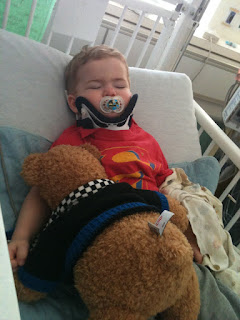I couldn't believe this was happening. I sat speechless, moved and awe struck by the conversation, the facts, and data. I've seen the news with the striking photos of slumped over, grey looking individuals in the middle of an overdose. Some parents driving babies and toddlers in minivans overdosing in parking lots of strip malls. It's a horrifying visual with so many children in the middle of the epidemic, affects to be felt for the rest of their childhood.
I couldn't sleep after that meeting. I thought of all the ideas that needed rapid deployment. You can't wait in this type of crisis. Things are needed now, small or large, but not slow.
 Then I remembered. Then I remembered how I knew what an overdose looked like. I walked in to the neurology floor to visit my two year old son. I had just had his brother only a few months before Alex was to have surgery. I walked in to his room where my husband was sitting. Setting the baby carrier on the floor, I walked over to his bed. He was a pale white, almost a greyish color. Alex's lips were starting to show a pale blue color and then they were turning a deeper blue. Alex occasionally jerked like he was catching himself from a fall you imagine in your sleep. I pressed the call button. "Please come in here and take a look at Alex. It looks like his lips are turning blue." A nurse came rushing in, quickly observed what was happening. The nurse advised, "I know what is happening". Within minutes or seconds, I'm not sure but it felt like seconds, she returned with Naloxone in an IV bag. She explained that sometimes patients have reactions to narcotics. Alex returned to himself, and opened his eyes and looked at us. I had shoved that memory to the back to my mind but it came back. It came back when I realized that I did see an overdose or a reaction. I did see the powerful effects of such a powerful drug, and one that reverses those effects if given quickly enough. It left an impression, and was scary to watch. I couldn't imagine this scenario in a parking lot, or a car, or someone's house. My poor son but he was okay, and so we moved on. The memory came back for a few days as I remembered it all again. I had a few days where I had trouble sleeping as I thought about that day, and thought about the experiences our communities and citizens, and first responders must be having today and tomorrow and the day after.
Then I remembered. Then I remembered how I knew what an overdose looked like. I walked in to the neurology floor to visit my two year old son. I had just had his brother only a few months before Alex was to have surgery. I walked in to his room where my husband was sitting. Setting the baby carrier on the floor, I walked over to his bed. He was a pale white, almost a greyish color. Alex's lips were starting to show a pale blue color and then they were turning a deeper blue. Alex occasionally jerked like he was catching himself from a fall you imagine in your sleep. I pressed the call button. "Please come in here and take a look at Alex. It looks like his lips are turning blue." A nurse came rushing in, quickly observed what was happening. The nurse advised, "I know what is happening". Within minutes or seconds, I'm not sure but it felt like seconds, she returned with Naloxone in an IV bag. She explained that sometimes patients have reactions to narcotics. Alex returned to himself, and opened his eyes and looked at us. I had shoved that memory to the back to my mind but it came back. It came back when I realized that I did see an overdose or a reaction. I did see the powerful effects of such a powerful drug, and one that reverses those effects if given quickly enough. It left an impression, and was scary to watch. I couldn't imagine this scenario in a parking lot, or a car, or someone's house. My poor son but he was okay, and so we moved on. The memory came back for a few days as I remembered it all again. I had a few days where I had trouble sleeping as I thought about that day, and thought about the experiences our communities and citizens, and first responders must be having today and tomorrow and the day after.My memory of that day has gone to the back of my mind again but what a powerful lesson. As parents or a family member, you're always the primary caregiver in the room with your child or loved one. Sure the machines would have notified the professionals of the emerging issue but not as fast as an observant parent or caregiver. It's also a lesson about medicine and its power. It's our duty to ensure we understand what's happening, what the effects are and what it looks like when something goes wrong. Every medicine is a powerful decision, and with that power needs to come with observance and careful monitoring and care and concern no matter what is being consumed. We are all caretakers of each other. The lesson will stay forever even after the memory fades.
That surgery is still the hardest surgery I have ever had done to another human being. It was a hard time. It's a memory and a lesson that I hope not to revisit ever again.
No comments:
Post a Comment